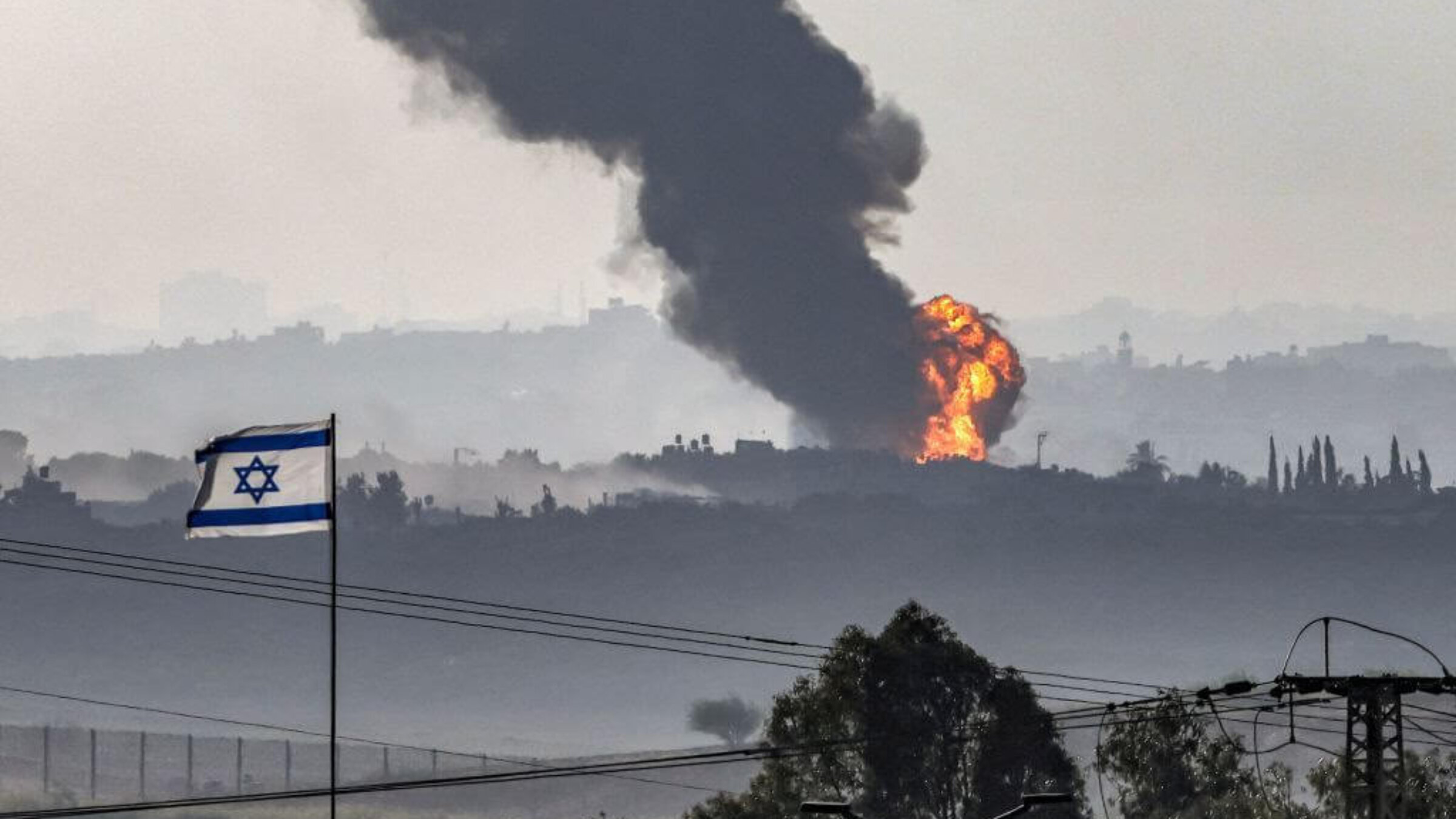Why an immediate ceasefire is a moral imperative — and the best thing for Israel
A ceasefire and hostage deal is the only credible endgame to the war in Gaza

‘Israel’s existence as a Jewish and democratic state depends on ending the conflict.’ Photo by Ronaldo Schemidt/AFP via Getty Images
Six months into the devastating war that Hamas spawned, my head and heart are filled with a single word, one used by both Israelis and Palestinians: Khalas. Enough.
Israel must immediately end the fighting in Gaza, committing to a ceasefire in exchange for the release of as many hostages as possible — and start the hard, hard work of restoring its international standing to ensure its future as a Jewish democracy alongside an independent, unoccupied Palestine.
Stopping the bloodshed and letting the world feed the starving people of Gaza is the clear moral imperative. It is also, now, clearly the only way forward for Israel and world Jewry.
Monday was Israel’s single worst day since the barbaric terror attack of Oct. 7 in which Hamas killed 1,200 people and kidnapped 240. Within a span of hours, its military committed the egregious error of killing seven aid workers from the beloved nonprofit World Central Kitchen, and its government passed an authoritarian law allowing it to shut down broadcast journalism it deems a threat.
A society that cannot abide critical — even outrageously unfair — coverage of its activities is a society that needs to reassess those activities.
Khalas; enough.
The core problem with Israel’s prosecution of this war is that its stated goal is impossible to achieve: Destroy Hamas. That is a slogan, not a strategy — reductive and simplistic, not unlike “Free Palestine.”
No reasonable expert on the region believes that any number of bombs, or years spent in control of the territory, could actually eliminate every Hamas commander, fighter, weapon and underground hideaway from Gaza, never mind prevent the next generation of terrorists from replacing them. “Destroy Hamas” really means “Degrade Hamas,” and Israel has done this, decisively.
The Israel Defense Forces said in mid-February that it had killed 12,000 Hamas militants in Gaza, including top commanders Marwan Issa, the No. 3 terrorist leader in the enclave; the head of Hamas’s aerial division; two battalion commanders; a brigade commander; and a deputy brigade commander. The military also has dismantled 20 of 24 Hamas battalions, officials said last week, and rendered inoperable up to 40% of the group’s estimated 300-mile tunnel network.
These are major, historic achievements that have eroded if not erased the threats to Israel from Gaza for the foreseeable future. As an email I got yesterday from the Jewish Federations of North America put it: “The number of Hamas rocket attacks on Israel remains negligible on most days, due to Hamas’ significantly diminished capabilities.”
The IDF could have declared victory on the battlefield weeks or even months ago in order to focus on the war’s other goal, freeing the remaining 134 hostages — several dozen of whom are believed dead — a goal truly essential to the soul of Israel and the Jewish people. Instead, it has promised to press its deadly campaign on through Rafah, the southern Gaza city where some 1 million Palestinian evacuees have been sheltering in tents — an operation that might further degrade but also cannot “destroy” Hamas, and would have disastrous collateral consequences.
It has become achingly, tragically clear that Prime Minister Benjamin Netanyahu does not want to declare victory and exit Gaza, because he knows it will lead to his own exit from power.
In any war — indeed in any complex problem — responsible leaders must constantly reevaluate the potential benefits versus the costs. After the horrific killing, kidnapping, rape and beheadings of Oct. 7, the world understood Israel’s need and right to defend itself, devastate Hamas, restore its security and free its captives. Its friends and allies offered wide berth for Israel to accomplish these goals, despite their high cost to Palestinian civilians.
But Israel has failed to make a compelling case for what marginal benefits continuing the fight could possibly bring toward the illusory goal of “destroying” Hamas, beyond the above-stated accomplishments on the actual, realistic goal of degrading it.
And it is beyond clear that the costs have become too high — not just for Palestinians, but also for Israelis, who do not deserve either the draconian anti-democratic crackdown their government is pursuing, or the pariah status the world is pushing on them.
I cannot say it any better or clearer than the great chef and humanitarian José Andrés, the founder of World Central Kitchen, did in his New York Times essay this week: “Israel is better than the way this war is being waged.”
To its credit, the IDF quickly investigated and took responsibility for the outrageous strike that killed Andrés’ colleagues in Gaza Monday. The strike was “a grave mistake,” it said this morning, “stemming from a serious failure due to a mistaken identification, errors in decision-making, and an attack contrary to the Standard Operating Procedures.” Two top IDF officers were fired over it.
I do not believe Israel purposely or wantonly killed these aid workers, or any of the thousands of other innocents slaughtered in the last six months. I do feel that the scale, nature and length of this war has made such “grave mistakes” inevitable, and it has to stop.
How many other “serious failures” and “errors in decision-making” have occurred where the victims were not foreigners working for a high-profile aid organization — and thus their deaths were not investigated? How many other attacks have been “contrary to Standard Operating Procedures”? We’ll likely never know.
Let it stop now. A ceasefire means no more airstrikes or ground battles, no Rafah invasion, a withdrawal of most if not all Israeli troops, and some kind of Arab-led international force to ensure security, feed the people, begin the gargantuan task of rebuilding. I understand how close to impossible this is. I also know it is the only possible path to any future peace.

I want to be perfectly clear that I do not believe Israel is committing genocide — it is not trying to systematically eliminate the Palestinian people. Israelis are also not settler colonialists. But the Israel right-or-wrong crowd’s cries — like AIPAC’s ridiculous statement yesterday that “calls for an immediate ceasefire should be directed exclusively to Hamas” — are equally blind to reality.
A Jewish leader who sat in on a recent Zoom briefing with Ron Dermer, Netanyahu’s closest adviser and a member of his war cabinet, told me that Dermer denied people were starving in Gaza. File this alongside the haters denying the sexual violence of Oct. 7.
You do not get to pick your enemies, or your neighbors. The fact that Hamas uses civilians as human shields; diverts food, water and medicine away from desperate people for its own use; wants to wipe Israel off the map; and calls in its charter for the wanton killing of Jews does not eradicate Israel’s responsibility for its own conduct. Nor does the fact that the Palestinians never miss an opportunity to miss an opportunity for peacemaking and have few prospects for responsible, nonviolent leadership.
And antisemitism, real as it is, is not an explanation for everything.
Israel’s existence as a Jewish and democratic state depends on ending the conflict. It cannot fight its way out of its hostile neighborhood. That’s why so many of its friends — including President Joe Biden and Sen. Chuck Schumer, hundreds of American rabbis, the editorial board of Haaretz — are also calling for a ceasefire.
Khalas.
Loyal readers may remember that I wrote a column some 14 months ago about wanting to scream “khalas” at the seemingly endless cycle of violence between Israel and the Palestinians. It was my visceral response to a Palestinian gunman’s murderous rampage that killed seven Jews as they left Shabbat services on a Friday night, a day after IDF soldiers shot nine people dead during a raid on the Jenin refugee camp.
How naive that seems now. As I wrote on Oct. 9, everything I thought I knew about Israel and Gaza was wrong.
The fighting in Gaza has now lasted 181 days; that is 3.5 times the length of the last Israel-Hamas war there, the one I covered in 2014.
The Palestinian death toll, 32,000 according to the United Nations, is 14 times that of a decade ago.
It is difficult to comprehend, never mind justify; perhaps that is why Netanyahu and his political partners do not want Israelis to see reports about the war on Al Jazeera.
A wise old man named Josh Weston — literally: he is 95 and the retired chairman and CEO of the data-processing giant ADP — asked me at an event back in November what Israel’s “credible endgame” was in Gaza. I struggled to answer, because I knew then, as I do now, that “Destroy Hamas” was not credible. Freeing the hostages was urgent and essential, but not an end in itself.
Weston’s question has been haunting me ever since. I’ve asked innumerable Israelis, lay and leader alike; most have no answer. The Day After for Israel and the Palestinians has never been more fraught. But the only credible endgame for the active war is a ceasefire, now.

















